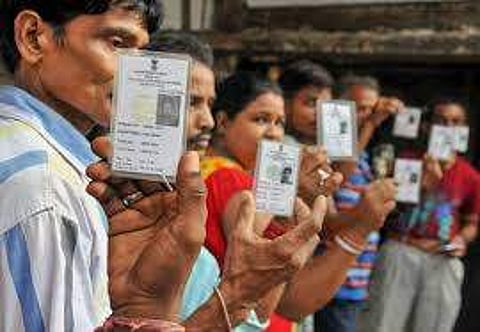

I am writing this column on the day when the counting of votes were taking place across the five states of Rajasthan, Madhya Pradesh, Chattisgarh, Telangana and Mizoram where assembly elections were held recently. While listening to different commentators and politicians on various news channels, I came across many poll-related terms and phrases such as ballot, coalition, exit poll, opinion poll, hung assembly, landslide victory, majority government, marginal constituencies, psephology, safe seat, spin, swing, tactical voting and turnout.
It is important for learners of English to be familiar with poll-related words, phrases, and collocations. Here are some of them: to go to polls, to cast vote, a hung assembly, to form a coalition, swing voters, spin doctors.
Who is a spin doctor? The phrase refers to a person who is an expert in public relations and who advises political parties on how to present their policies and actions. A spin doctor ensures that others interpret an event from a particular point of view. Some media people and anchors too play the role of a spin doctor and influence the viewers and readers. These days, in some TV debates we can witness panelists playing the role of spin doctors. Spinning is a manipulative skill. Look at these news headlines:
For elections, Congress trains and tests new spin doctors | NDTV.com
The BJP’s new-age spin doctor | Business Standard Column
What does the phrase ‘tactical voting’ mean? It refers to the act of voting for a political party that we don’t support in order to prevent another party from winning. By doing so, voters keep out a more disliked rival. Some analysts are of the opinion that in the recent assembly elections, many voters in northern states wanted to prevent BJP from winning and so, they voted for Congress. Here are examples of the phrase being used:
Tactical voting is an important element of British electoral behaviour.
Is it morally right to do tactical voting?
Let’s look at some more collocations of election terms: to lose ground, to (re)gain ground, to maintain surge, to stake claim, to concede defeat, neck-and-neck battle, a thumping win, to be locked in seesaw battle, to sound a warning, to make massive gains, to write someone off, to give a clear verdict, to improve its footprint, to head for a comfortable win.
The idiomatic expression ‘to lose ground’ means to become less popular or to be given less support than expected. Similarly, the phrase ‘lost ground’ means lost popularity or success. Look at these examples:
The candidate was once popular. Now, in the recent election, he lost ground.
BJP has lost ground in all the five states where the assembly elections were held.
The phrase ‘to gain ground’ is the opposite of ‘to lose ground’. It means to become more widely known or more popular. Here are examples:
Your views on education reforms have steadily gained ground.
Telangana Rashtra Samithi has gained ground in Congress belt.
The expression ‘to maintain surge’ means to maintain lead. The word ‘surge’ refers to sudden and great increase in something:
BJP was voted out by Congress in Chhattisgarh and Rajasthan and the grand old party maintained its surge in Madhya Pradesh too.
The ruling TRS maintained surge ahead of the Congress and the BJP in most seats.
The phrase ‘to concede defeat’ means to admit that one has been defeated in a competition, race or an election:
Prime Minister Narendra Modi conceded defeat in the Assembly elections and congratulated the Congress on their victory.
“Leadership is not about the next election, it’s about the next generation” - Simon Sinek
